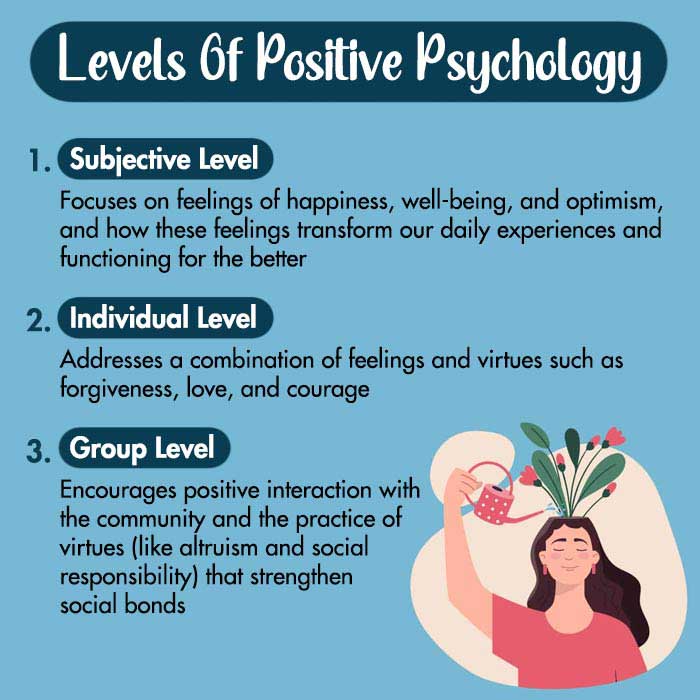Positive Psychology is a branch of psychology that focuses on the scientific study of what makes life most worth living. Instead of concentrating only on mental illness or psychological problems, it emphasizes human strengths, well-being, and optimal functioning.
It explores concepts such as:
- Happiness and life satisfaction
- Resilience and grit
- Strengths and virtues
- Gratitude, compassion, and empathy
- Flow and engagement
- Meaning and purpose in life
Founded formally by Dr. Martin Seligman in the late 1990s, positive psychology aims to help individuals, organizations, and communities thrive by understanding and fostering the elements that contribute to a fulfilling and flourishing life.
What Is Positive Psychology?
Positive psychology is one of the emerging branches of psychology that studies optimal experience, well-being, and ways to live prospering lives 1 Phan, H. P., Ngu, B. H., Chen, S. C., Wu, L., Shi, S. Y., Lin, R. Y., Shih, J. H., & Wang, H. W. (2020). Advancing the Study of Positive Psychology: The Use of a Multifaceted Structure of Mindfulness for Development. Frontiers in psychology, 11, 1602. https://doi.org/10.3389/fpsyg.2020.01602 . It challenges the assumptions of the “disease model 2 Jeste, D. V., Palmer, B. W., Rettew, D. C., & Boardman, S. (2015). Positive psychiatry: its time has come. The Journal of clinical psychiatry, 76(6), 675–683. https://doi.org/10.4088/JCP.14nr09599 ” that focuses on dysfunctional behavior and strives to help people work on their existing strengths instead.
The father of positive psychology 3 Seligman M. E. P. (2019). Positive Psychology: A Personal History. Annual review of clinical psychology, 15, 1–23. https://doi.org/10.1146/annurev-clinpsy-050718-095653 , American psychologist Martin Seligman formulated the theory in the 1980s—drawing from the Greek concept of eudaimonia (meaning “good spirit”) and certain ideas of humanistic psychology.
Seligman’s theory of positive psychology emphasizes the importance of identifying, embracing, and using our unique set of signature strengths to cultivate a life that is pleasurable, fulfilling, and meaningful. These strengths—rooted in virtues like humanity, temperance, courage, justice, and perseverance—are most impactful when combined with values such as ethical behavior, intrinsic motivation, and gratitude. Together, they form the foundation for personal growth and lasting well-being.

PERMA Model
Seligman’s theory has five main elements 4 Kern, M. L., Waters, L. E., Adler, A., & White, M. A. (2015). A multidimensional approach to measuring well-being in students: Application of the PERMA framework. The journal of positive psychology, 10(3), 262–271. https://doi.org/10.1080/17439760.2014.936962 , including
- Positive emotions: Experience of optimism, gratitude, hope, and contentment.
- Engagement: Involvement in enjoyable hobbies and activities of interest.
- Relationship: Forming and maintaining work-related, familial, romantic, or platonic social connections.
- Meaning: Finding purpose and meaning in life.
- Accomplishments: Achievement of goals and the pursuit of success and mastery.
Positive Psychology Activities
Positive psychology activities include certain exercises and tools geared toward nurturing our key strengths and virtues. There are different ways to use positive psychology that can serve to enhance our positive emotions, positive individual traits, and our interactions with positive social institutions.
Some of the most effective and common positive psychology exercises and tools are:
1. Gratitude Journaling
Maintaining a gratitude 5 Sansone, R. A., & Sansone, L. A. (2010). Gratitude and well being: the benefits of appreciation. Psychiatry [Edgmont (Pa. : Township)], 7(11), 18–22. journal can help us recognize feelings of thankfulness and appreciation which have been proven to increase positive emotions and well-being.
Read More About Gratitude Here
2. Designing a day
Designing a daily schedule that involves a healthy diet, quality sleep, adequate exercise, and opportunities for socialization does wonders for our positive mindset and mental health. This is also known as setting the agenda for the day.
3. Practicing random acts of kindness
Practicing gratitude and showing it to others can go a long way in enhancing our well-being 6 Otake, K., Shimai, S., Tanaka-Matsumi, J., Otsui, K., & Fredrickson, B. L. (2006). HAPPY PEOPLE BECOME HAPPIER THROUGH KINDNESS: A COUNTING KINDNESSES INTERVENTION. Journal of happiness studies, 7(3), 361–375. https://doi.org/10.1007/s10902-005-3650-z . Small gestures like helping someone with their chores or sending “thank you” notes and letters can have a big impact on our mood and satisfaction with our lives and the people around us.
4. Mindfulness exercises
Mindfulness techniques and activities like meditation, yoga, etc. can help decrease stress as well as risks of mental and physical health conditions.
Read More About Mindfulness Here
5. Values in Action Inventory of Strengths (VIA-IS)
The VIA-IS 7 Ng, V., Cao, M., Marsh, H. W., Tay, L., & Seligman, M. E. P. (2017). The factor structure of the Values in Action Inventory of Strengths (VIA-IS): An item-level exploratory structural equation modeling (ESEM) bifactor analysis. Psychological assessment, 29(8), 1053–1058. https://doi.org/10.1037/pas0000396 is one of the most commonly used tools in positive psychology and positive psychotherapy. It’s a questionnaire that allows people to identify their dominant strengths, allowing them to focus their energy and attention on using their inherent strengths in their daily life, instead of getting distracted by the skills or traits they may feel they are lacking.
Positive Psychology Examples
Here are a few simple yet powerful ways to incorporate positive psychology into your everyday routine:
1. Start a Gratitude Journal
Choose a notebook or diary and dedicate it to daily gratitude. Set aside a quiet time each day—perhaps in the evening—and write down three to five things you’re genuinely grateful for. Be specific and descriptive. Reflecting on why these moments or people matter to you deepens the sense of appreciation.
2. Visualize Your Best Possible Future Self
Spend around 15 minutes daily imagining or writing about your ideal future. Picture yourself achieving your goals and living the life you truly want. You can journal it, speak aloud, or record it—whatever helps you connect with your vision. This exercise enhances optimism, motivation, and clarity.
3. Track Your Daily Activities and Strengths
Create a chart to log your daily activities. For each activity, note the emotions it evokes, the energy it consumes (rate it on a scale of 1–10), and the personal strengths it taps into. Over time, this helps you recognize patterns, build self-awareness, and boost your self-confidence by identifying your core virtues in action.

All of these activities are easy to implement at home and require minimal resources.
Positive Psychology In Mental Health
Positive psychology gives mental well-being 8 Bohlmeijer, E., & Westerhof, G. (2021). The Model for Sustainable Mental Health: Future Directions for Integrating Positive Psychology Into Mental Health Care. Frontiers in psychology, 12, 747999. https://doi.org/10.3389/fpsyg.2021.747999 the utmost importance when it comes to living a ‘disease-free’ life. It espouses health strategies that promote positive feelings, self-satisfaction, positive thinking, emotional management, and self-regulation.
This helps in finding the true meaning of happiness, spirituality, empathy, and forgiveness, as well as building strong social relationships.
The practice of positive psychology in a clinical setting draws from the support and regeneration of existing strengths and strives to ‘reorient’ people into developing the best qualities in life.
It has been incorporated into a number of therapies to treat symptoms of depression, anxiety, mood disorders, etc. It is also used to assist patients recovering from memory disorders and traumatic brain injury. The uses of positive psychology are evident in popular therapies like:
- Cognitive-behavioral therapy [Read more]
- Family therapy 9 Carr A. (1997). Positive practice in family therapy. Journal of marital and family therapy, 23(3), 271–293. https://doi.org/10.1111/j.1752-0606.1997.tb01036.x
- Positive psychotherapy, etc.
Benefits Of Positive Psychology
Some uses of positive psychology are also associated with:
- Healthy and responsible parenting, particularly positive parent-child relationships
- Better adjustment in school settings and peer groups
- General social and emotional well-being
- Optimism and prosocial behavior
- Reduced risks of coronary and cardiovascular diseases 10 Park, N., Peterson, C., Szvarca, D., Vander Molen, R. J., Kim, E. S., & Collon, K. (2014). Positive Psychology and Physical Health: Research and Applications. American journal of lifestyle medicine, 10(3), 200–206. https://doi.org/10.1177/1559827614550277 , etc.
- Healthier interpersonal relationships
Disadvantages Of Positive Psychology
Despite its many advantages, positive psychology remains a subject of debate—both in theory and in practice. This can be attributed to the facts that:
- One reason is its inherently subjective interpretation; clinicians and individuals often differ in how they understand and apply its principles. Furthermore, excessive or forced optimism can actually be harmful to mental health, making positivity seem more like a burden than a benefit.
- It’s also important to recognize that moderate levels of stress and anxiety can serve a functional purpose—enhancing alertness, promoting problem-solving, and contributing to psychological resilience. Ignoring or minimizing these emotional processes can disrupt healthy coping and self-regulation.
- Moreover, positive psychology itself acknowledges a critical paradox: the pursuit of happiness as an end goal can backfire, leading to dissatisfaction rather than fulfillment. True well-being, the theory suggests, arises not from chasing happiness, but from cultivating meaning, engagement, and authentic connection.
Takeaway
Positive psychology is a relatively recent development within the field of psychology, yet its impact on therapeutic practices and the promotion of well-being is already well recognized. Its principles have been effectively applied to enhance mental health, foster resilience, and strengthen positive relationships. As the field evolves, researchers and practitioners are increasingly exploring how its techniques can be harnessed to address serious mental and physical health challenges, paving the way for more holistic approaches to healing and personal growth.
At A Glance
- Positive psychology is the scientific study of what makes life worthy, purposeful, and fulfilling.
- It was formulated by American psychologist Martin Seligman.
- It focuses on ways to achieve happiness, both at individual and societal levels.
- It can be used in several therapies to treat mental and physical health disorders.
- Common positive psychology examples include journaling, practicing gratitude, availing mindfulness exercises, etc.
Frequently Asked Questions (FAQs)
1. How effective is positive psychology?
Positive psychology is effectively employed in therapeutic practices and mental health treatment plans to improve physical and mental well-being. The impact of positive psychology is far-reaching and many people also turn to it for non-medical reasons—to experience happiness and develop optimism, gratitude, and altruism.
2. How can we practice positive psychology?
Positive psychology can be easily practiced through journaling, practicing gratitude, availing adequate exercises, etc.
3. How does positive psychology apply to life?
Positive psychology techniques can be used in everyday life for reducing stress and anxiety and increasing psychological resilience. It can also be used to promote personal growth, well-being, and quality of life.
4. How does positive psychology impact us daily?
Practicing common positive psychology techniques (such as gratitude journaling and mindfulness exercises) can do wonders for your mental and physical health on a daily basis.











